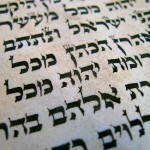Authenticity of the Oral Torah – Ask the Rabbi
Q. How do we know that the “Oral Torah” as we have it today is authentic? Surely inaccurate teachings/interpretations may have crept in?
 A. One of the reasons that we need an oral tradition is that on many things the written Torah is short on details.
A. One of the reasons that we need an oral tradition is that on many things the written Torah is short on details.
For example, it believes in marriage but does not explain the marriage procedures; it believes in shechitah but does not record the method of carrying it out.
According to tradition, Moses was given the Oral Law on Mount Sinai in addition to the Written Torah (the Five Books of Moses or Pentateuch) and thenceforward it was handed it down by word of mouth.
When new situations arose, the “judge who shall be in those days” was empowered to make a ruling utilising the system of interpretation that derived from Moses’ day. Sometimes one rabbinic judge ruled differently from another, perhaps because of special circumstances in his time and place.
Oral rulings were eventually codified, and though no full code has been compiled since Joseph Karo in the 16th century there are partial codes and countless rabbinic “responsa”.
In the unlikely event that a rabbinic ruling is plain wrong there are always authoritative books and great experts to consult, and a concerted effort will be made to persuade the writer of the mistaken ruling to issue a correction.



